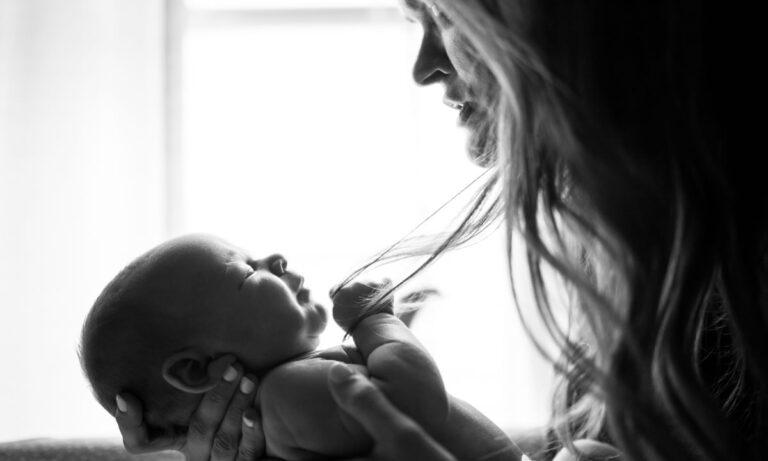Q: Every night, I put my 13-month-old daughter to sleep in our family bed, but shortly afterward, she wakes up and I have to start all over – breastfeeding her and helping her fall asleep. This keeps happening, and I cannot stay up with my husband so we can have a bit of time for ourselves. She also wakes up a lot at night. How can I help my toddler stay asleep?
A: Some babies and toddlers sleep deeply even after you leave the room, while others become anxious sleepers unless you stay with them at all times. When you leave your toddler in the family bed by herself, her experience is the same as sleeping in a crib because you are not there. Your daughter is obviously not able to sleep away from you even for a short time.
Using sleep as a “babysitter” to provide couple time works well for some families, but not for everyone. Even babies who are able to stay asleep in another room often stop being so accommodating as they grow older.
Some babies and toddlers sleep deeply even after you leave the room, while others become anxious sleepers unless you stay with them at all times. When you leave your toddler in the family bed by herself, her experience is the same as sleeping in a crib because you are not there. Your daughter is obviously not able to sleep away from you even for a short time.
Using sleep as a “babysitter” to provide couple time works well for some families, but not for everyone. Even babies who are able to stay asleep in another room often stop being so accommodating as they grow older.
Why Your Toddler Wakes Up
Once your baby wakes up to discover that you are gone, she can develop anxiety about falling asleep and become a light sleeper. If she has always been a light sleeper, then finding herself alone intensifies her difficulty in staying asleep. She is scared of finding herself alone and therefore wakes up to make sure that you are with her. Once you are in bed, she keeps waking up because she doesn’t trust that you will stay.
Although there may be other causes for a toddler to wake up frequently, there is a need for consistency and it has a connection to waking up frequently. Always consider other possible issues: nightmares, health, emotions, hunger, etc. If all other issues are taken care of, your child’s need for your presence is the most likely cause of her wakefulness.
When babies are left alone in a crib for whole nights, they eventually resign themselves to the situation and learn not to expect Mommy or Daddy to return, which is extremely painful and harmful to the child’s development and emotional well-being. In contrast, your securely attached toddler does not give up. She counts on your consistent presence. In fact, she is so sure of the rightness of her need that she keeps waking up to ensure that you are there, knowing that you will respond and return when she calls you.
Securely attached babies who seem content to be left to sleep for a couple of hours without their parents could be either unaware of the parents’ absence or just more mellow by nature. However, as they grow older, almost all children develop a dislike for going to bed ahead of their parents and for being in bed alone. When securely attached, children expect our consistent presence and they need it. Children’s need for parental presence is especially important when they sleep because sleep is scary for young ones. It is a primal need of the child to know that he is not left alone while unconscious. When our children are young, it is the security of our physical closeness that allows them to relax and sleep well.
Still, many parents create a long and wonderful bedtime ritual that the children enjoy, and, as a result, the children do fall asleep and stay in bed peacefully. There is not one right way to achieve this, and in time, you will find your own family’s joyful path to retiring at the end of the day.
Helping the Light/Anxious Sleeper
Your daughter is more likely to accept an early bedtime in the future if she has no anxiety associated with sleep. To help her develop good sleeping habits, you must eliminate the discomfort she now associates with sleep. If she is never left to sleep alone, she can most likely regain her trust in your consistent presence and over time develop a calm, uninterrupted sleep.
Let your toddler stay with you. She may fall asleep in your or her father’s arms or on the couch right beside you. If she wakes up, she will find that you never left. If she is not directly on you, make sure to put your hand on her body any time she seems to be waking up. This way, sensing your presence, she may drift back to sleep without waking up.
When she does fall asleep, it is crucial that you don’t put her in bed without you. You don’t want her to wake up and feel cheated out of your presence. Keep her with you and enjoy your cozy time with your partner or other children.
What If She Doesn’t Fall Asleep Unless in Bed?
It is likely that a toddler who needs your presence is also one who would stay awake as long as you are, especially when she isn’t sure you will stay with her once she is asleep. It is also possible that your daughter has gotten used to sleeping in bed and lost her ability to drift off elsewhere.
If she is very willful and stays up, my suggestion is to celebrate this wonderful time together. Play, read, eat, laugh, and have a good time. Play with her, even though she may be tired and cranky. When toddlers fight sleep, our attempt to put them to sleep only ignites their resistance and creates mistrust and struggle. She will be much less cranky, despite her sleepiness, if you play with her. Even crying and loss of control is better than anxious sleep; validate her feelings, hold her, and let her run her own inner life.
Most likely, at this stage in your family’s life, you will all go to bed at the same time. This may not seem ideal, but consider the benefits: Your husband gets one more opportunity to bond with his daughter; you may get a longer night’s sleep; you won’t have to spend time putting her to bed. And cuddling together is so much more fun than uninterrupted sleep.
When I suggest this possibility, parents often resist and say, “But she is tired” and “We need couple time.” Trust nature. Within a couple of weeks, she will settle into a new pattern. She will get the amount of sleep she needs. However, you can also consider a different solution: Instead of your child going to sleep later, you and your husband can go to bed with her earlier. Go to bed as a family and have a wonderful cuddling, laughing, singing, and loving time. Then, since it is early for you, you may have some couple time after your child drifts off; just don’t leave the bed.
When we resist reality, we may become blind to many peaceful solutions. If, in reality, your toddler won’t sleep on her own in the evening, then that couple time is not happening anyway, at least not regularly or peacefully. Why keep struggling to get something in a way that is not working? Freed of preconceived ideas about when and how bedtime and couple time should happen, you can find much better times and ways to be together as a couple. You may even find that being with your husband and your toddler together is rather romantic, that it nourishes your connection with him in a different way, and that you can even be affectionate.
Instead of trying so hard to make your child fit your fixed plans, plan around her way of being. Parenting is a path of surrender and letting go of control. The less you try to control, the more peace you will have. The more peaceful you are, the less anxious your child will be.










